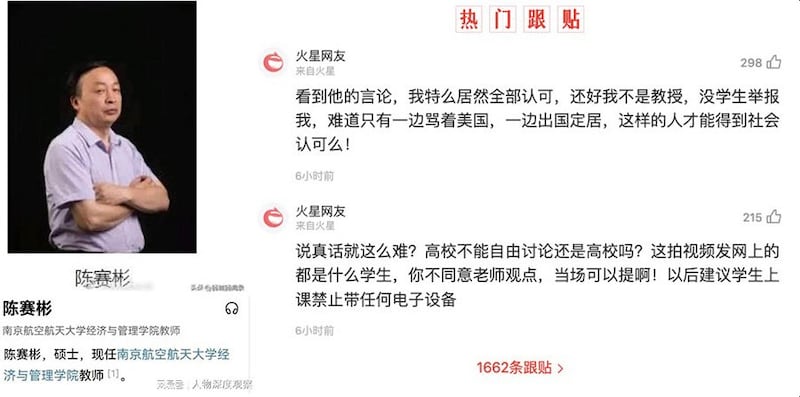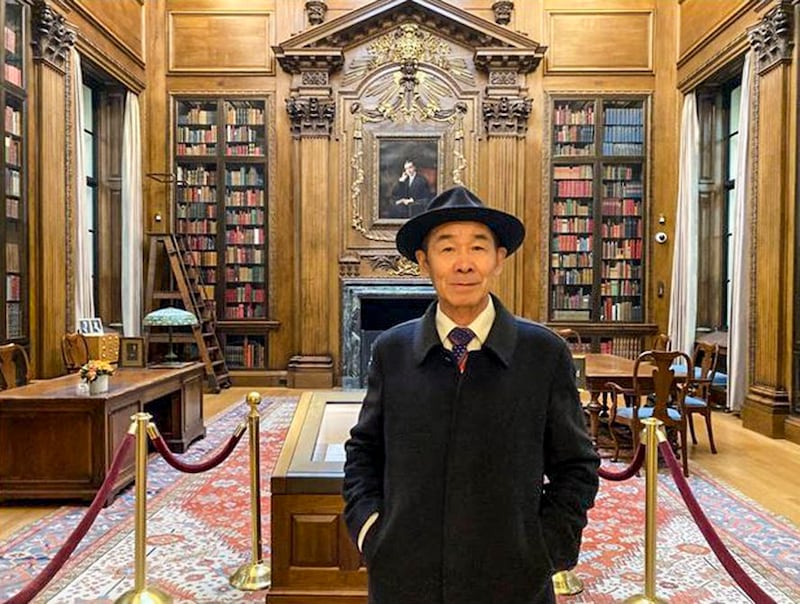Authorities in the eastern Chinese city of Nanjing are investigating a university lecturer for making "inappropriate remarks" after he told his class that China is currently dependent on food imports from the United States and Europe, alongside other pro-U.S. comments running counter to ruling Chinese Communist Party narratives, according to recent social media posts.
The lecturer was named on social media as Chen Saibin from the school of economics and management at the Nanjing University of Aeronautics and Astronautics.
"Social media posts currently circulating about a lecturer from this university who made inappropriate remarks have prompted concern and public debate," the university's Communist Party committee said in a statement on March 9.
"We take this very seriously, and have immediately set in motion an investigation," it said. "The lecturer's classes will be suspended for the duration of the investigation."
The move comes as the ruling Chinese Communist Party tightens its ideological grip on higher education in the country amid structural changes begun in 2021 that allow a far greater degree of party control in the day-to-day running of colleges and universities.
The university said it had a zero-tolerance policy towards "moral misconduct" among faculty, a reference to a political buzzword used to refer to teachers who refuse to toe the party line in class.
The topic of food security is a highly sensitive one for Beijing, which has ordered officials at every level to crack down on food waste, and recently revamped a Mao-era system of food distribution that analysts said could provide a network of emergency logistics in the event of war.
China has repeatedly refused to rule out the use of military force to annex Taiwan, which has never been ruled by Beijing and whose 23 million people have no interest in giving up their sovereignty or democratic way of life, with analysts suggesting an invasion could be possible in the next few years.
‘More civilized, more developed and more free’
Screenshots posted to social media reported that Chen had told his class: "China depends on Europe and the United States for food. If the U.S. imposes sanctions, then more than half of Chinese people will starve to death."

Chen also allegedly said that all of modern math and physics, as well as Marxism, are Western imports, as are a number of key engineering principles and many ideas in the liberal arts.
He also reportedly expressed support for gun ownership in the United States, a key propaganda tool used by Beijing against Washington, saying it could better protect women's safety.
"This is a sign that they are more civilized, more developed and more free in the United States," Chen allegedly told his students, according to the screenshots, citing the vicious beatings of several women at a Tangshan barbecue restaurant in June 2022 as evidence that the U.S. is safer than China for women.
State media and officials have repeatedly used gun violence as a way to hit back against criticism of Beijing's rights record, or security measures and sanctions imposed by the United States.
The English-language Global Times quoted a U.S.-based student in February as saying "Chinese students in the U.S. face multiple torments of gun violence and racial discrimination," while a Feb. 28 article in the same paper said the U.S. claim to be a "beacon of democracy" was undermined by "drug abuse, growing worries around gun violence [and] an ever-widening economic gap between the haves and the have-nots."
An employee who answered the phone at the management committee at the university's Jiangjun Road campus confirmed the statement and the lecturer's identity when contacted by Radio Free Asia on March 9.
"Our party committee has already responded to this," the employee said. "The matter is under investigation, and there are no conclusions yet."
Retired Shanghai lecturer Gu Guoping said none of Chen's comments had violated Chinese law, however.
"These so-called inappropriate remarks don't break any current Chinese law," Gu said. "It's part of the academic tradition to express different views and opinions."
Informing on lecturers
Current affairs commentator Bi Xin said it is increasingly common for students to inform on comments made by lecturers and teachers in class, citing the cases of other lecturers who had lost their jobs after making comments that were out of line with Communist Party propaganda.
" You Shengdong, a professor of economics at Xiamen University, said in class that the Chinese dream of [supreme leader] Xi Jinping was nothing but a fantasy, rather than being something rational," Bi said. "He was fired after his students reported him."
" Tang Yun, associate professor of literature at Chongqing Normal University, told his students that the official slogan "roll up your sleeves and work hard" did violence to the elegance of the Chinese language," he said. "His students complained about him and his teaching qualification was revoked."
"There is a terrifying culture now of students informing on their teachers," he said.

A resident of the central province of Hubei who gave only the surname Mao for fear of reprisals, said a culture of informing is the product of an authoritarian regime.
"It causes extreme mutual distrust and suspicion at every level of society," Mao said. "This causes basic standards of social morality to deteriorate."
Some social media comments thought Chen's comments were indeed out of line, and shouldn't be allowed to go unchecked.
Some referred to Chen as "a bad influence" who should be investigated, while others called for the "vigorous removal of poisonous teachers and poisonous teaching materials."
Other comments lamented that Chen hadn't been allowed to "tell the truth" in class, while some hit out at the students, saying they should have challenged Chen at the time rather than posting his comments on social media.
Education ministry guidelines on "moral misconduct" among university lecturers dated Nov. 8, 2018 call on universities and colleges to take action if faculty fail to toe the party line, ranging from public criticism and demerits affecting promotion and research funding to dismissals and the revocation of teaching credentials.
"Those who are members of the Chinese Communist Party will be sanctioned under party disciplinary processes at the same time," the guidelines said.
"Those who are suspected of breaking the law and committing crimes will have their cases transferred to law enforcement and judicial agencies."
Translated by Luisetta Mudie .
